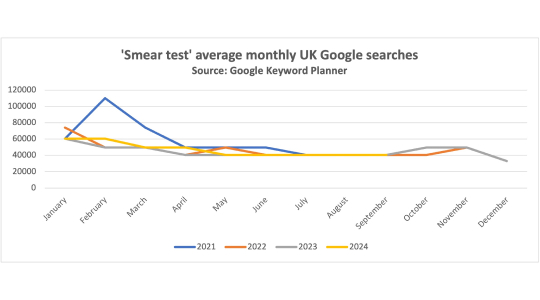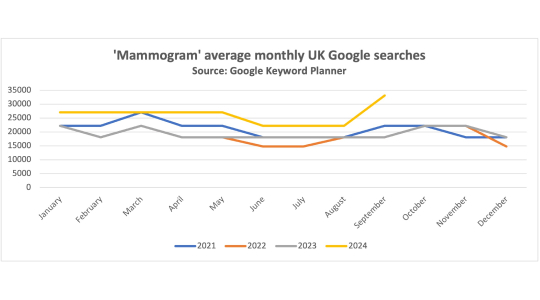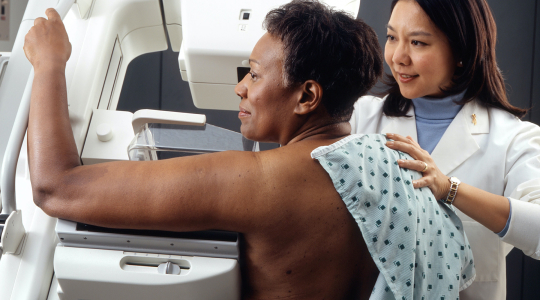Make female health your priority
Why it’s more important than ever to prioritise female health

Cervical screening and mammograms are important screenings to prevent cancer. They can detect abnormal changes in your cells before you or your doctor notices any signs of a problem.
We've analysed the UK's online search habits over the last three years for both of these female health checks. Promisingly, more of us have been researching around mammograms, when compared to previous years. But, it’s clear that there s still some room for improvement.
Google search analysis shows that the UK expressed a keen interest in researching smear tests in early 2021. However, search interest has reduced slightly in more recent years

Average search volumes for mammogram’ have steadily grown in the last few years, especially in 2024, where search volumes have been consistently higher. This indicates a promising level of awareness of this screening.
It's key that this search interest for both female checks translates into appointment bookings. So that abnormal changes can be detected at the earliest possible stage.
Data correct as at 24th October 2024.

Reach out if you spot anything unusual
With the majority of female health concerns, especially, the key is spotting and treating problems early.
You should regularly check your breasts to spot any changes. Becoming more aware of how they usually look and feel will help you to feel confident about noticing any changes.
If you do spot anything unusual, it’s important to and get this checked as soon as you can.
Female health myths
Our experts have compiled a list of the common myths that could prevent women from going for their smear test or mammogram.
Cervical screening is not a test for cancer - it is used to help prevent cancer. A sample is checked for certain “high risk” types of HPV. If these are not found, then nothing further is done but if these types of HPV are present then the cells from the sample are checked for any changes. If any abnormal cells are found and these are left untreated, it could lead to cancer.
Having regular cervical screening will identify any abnormalities – these may not be cancerous, and mild abnormalities don’t always need to be treated. Depending on the result, you may need to have treatment to remove or destroy the abnormal cells. In any case, your GP should contact you with next steps, and will be able to answer any concerns you have.
Some people may find a smear test uncomfortable, but it shouldn’t hurt. If it does hurt or if you’re feeling especially nervous, let your clinician know so they can try and make you more comfortable. Try to relax, as this should reduce any discomfort you feel.
A mammogram procedure may be uncomfortable due to the nature of the test, but this discomfort only lasts a few seconds. If you are worried about the procedure being painful, let your mammographer know before the procedure begins.
Only a small percentage of breast lumps turn out to be cancer. If you notice a lump in your breast, it’s very important to get this checked by your doctor; a lump or change to the feel or appearance of your breasts should never be ignored.
You should check your breasts whenever it is convenient for you. Do it as often as you feel you need to do so, as it’s important to notice any changes quickly. Any changes to your breast to how they feel, or look should be noticed and reported to your GP.
It’s important that you check your breasts regularly and attend your female health appointments. Mammograms are an important procedure for women over the age of 50, as most cancers found during a mammogram are at an early stage when they are too small to see or feel; meaning you may not have noticed a change in appearance or touch.
Female health checks across all ages are there to detect any early signs of abnormalities and cancer. It’s important to attend all of your female health checks and regularly examine yourself. Even if you’re showing no unusual symptoms, you must attend your checks as these can detect abnormalities before you start showing any symptoms. Early detection is key to effectively treating cancers; attending all appointments – even if you’re feeling well – is vital.
NHS routine female health checks
Depending on your age, there are routine female health tests available on the NHS. It's really important to attend these appointments, so if you're worried you should speak to your nurse or GP about any concerns you may have.
In your 20s
Cervical screening - you have a smear test every three or five years, depending on your age.
If you’re between the ages 25-50, you will have cervical screening every three years.
After you reach 50, cervical screening takes place every five years.
In your 30s and 40s
Cervical screening - you have a smear test every three years.
In your 50s
Mammogram - all women aged 50 up to 71 are offered a mammogram every three years.
Cervical screening - once you reach 50, you’re invited every five years for a smear test.
In your 60s
Bowel cancer screening every 2 years, in some areas, bowel cancer screening begins at aged 55. If you’re over 55, you will be invited for a one-off bowel scope screening test if it’s available in your area.
If you’re aged between 60 and 74, you’ll be invited to do a home testing kit every 2 years.
Breast screening (mammogram) offered up to age 71 but you can continue to request 3 yearly screening by contacting your local mammography screening programme.
Cervical screening will stop when you reach 64.
What female health checks do Bupa offer?
Alongside the NHS female health checks mentioned, you can get your health checked with us. We offer:

Female health concerns
Our digital GP service in the My Bupa app lets you talk to an online doctor by video or audio call, day or night about any female health concerns you have. Including on weekends and bank holidays.
You can also talk to nurses, physios or mental health specialists.
Calls are included in your health insurance and they won’t affect your claims.

Female health assessments
If you don’t have health insurance, you can talk through any female health concerns relating to breast and gynaecological health by booking a female health assessment at one of our Bupa Health Clinics.
Interested in finding out more?
Here’s some useful female health articles you may be interested in.

Women’s health
We’ve got a wealth of information on a range of conditions, treatments and procedures relating to women's health.

Postpartum mental health
Analysis of the UK's searching habits has found a surge of new parents reaching out for mental health support.

Ovarian cancer
We cover some of the key facts about ovarian cancer including risks, symptoms and what to do if you think you may have the condition.

Women turning to Google for 'abnormal' health worries
Recent research from Bupa Health Clinics reveals an increase in searches on Google for ‘abnormal’ women's health concerns.
Bupa health insurance is provided by Bupa Insurance Limited. Registered in England and Wales No.3956433. Bupa Insurance Limited is authorised by the Prudential Regulation Authority and regulated by the Financial Conduct Authority and the Prudential Regulation Authority. Arranged and administered by Bupa Insurance Services Limited, which is authorised and regulated by the Financial Conduct Authority. Registered in England and Wales No. 3829851.
Bupa Health Assessments and Private GP services are provided by Bupa Occupational Health Limited. Registered in England and Wales No.631336. Registered office: 1 Angel Court, London EC2R 7HJ
The My Bupa App is provided by Bupa Insurance Services Limited which is authorised and regulated by the Financial Conduct Authority (FCA). Registered in England and Wales at 1 Angel Court, London, EC2R 7HJ. Its company number is 3829851. VAT Registration Number: 239731641.
Digital GP Services are not regulated by the Financial Conduct Authority or the Prudential Regulation Authority.


